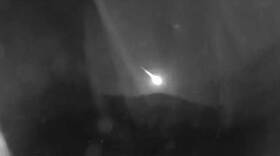The Perseid meteor shower peaks late tonight and early tomorrow morning. From the Arizona Science Desk, Melissa Sevigny reports on why this year is expected to be extraordinary.
The Perseids take place each summer when Earth’s orbit crosses a cloud of leftover comet debris. Particles the size of a sand grain burn up in the atmosphere, creating shooting stars.
This year astronomers expect twice as many as usual—perhaps two or three a minute. Kevin Schindler of Lowell Observatory explains this so-called “outburst” is caused by Jupiter’s gravity.
“This year is particularly good because Jupiter has pushed that cloud of Perseid debris around a little bit, so now it’s going to be closer to where Earth is going to intersect it,” Schindler says.
The best viewing will be after midnight (when the moon sets) and before dawn on Friday. Shooting stars will radiate from the constellation Perseus, which rises in the northeast.
The shower will continue but taper off over the next two weeks.







